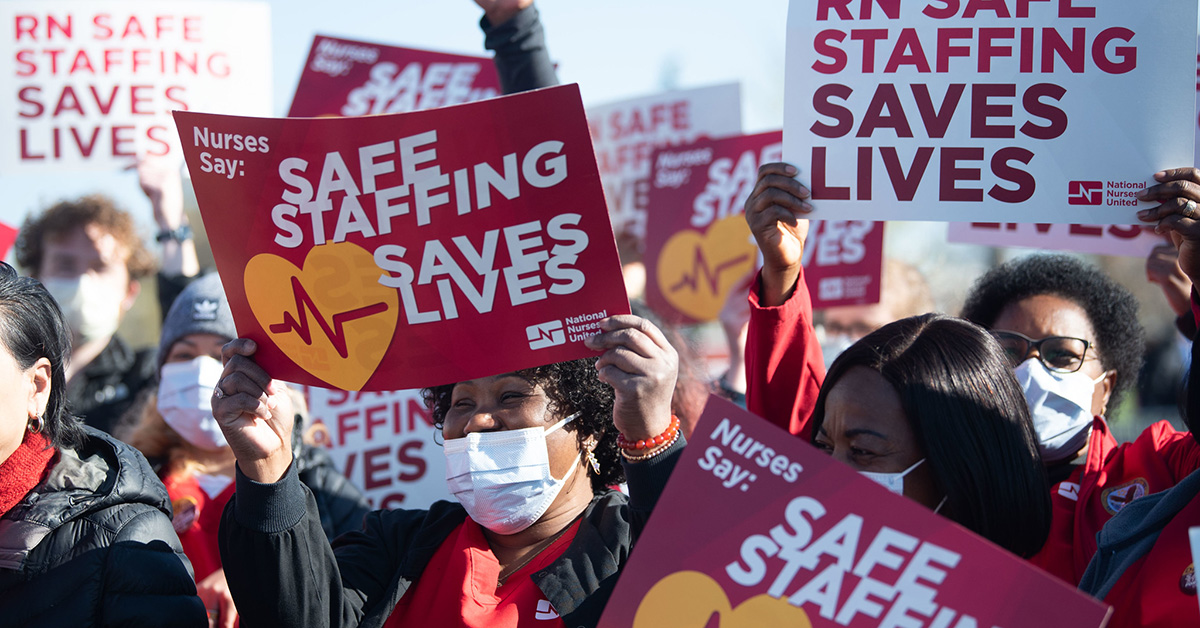A message to Congress

RNs say mandate safe nurse-to-patient staffing limits now
By Bonnie Castillo, RN
National Nurse Magazine - April | May | June 2023 Issue
Every day, we nurses live out real-life horror stories, as we go 12-plus hours without a single break while rushing between patients who all need our care at once. Our patients languish in feces because we don’t have time to help them to the bathroom, they wait multiple days for a bed in emergency departments, and they acquire preventable infections. There just aren’t enough hands to do all the work. But we know “staffing crisis” and “staffing shortage” must not be mistaken for the same thing.
The U.S. Senate recently held a committee hearing on the nation’s need for nurses and other health care workers, asking “Where do we go from here?” America’s RNs have the answer: Listen to us. We understand that the true problem is hospital industry greed, and that the solution lies in improving working conditions to make it safe for us to stay in our jobs. Congress must not turn to hospital executives for solutions to the nurse staffing crisis, for they are the ones who caused it by deliberately understaffing every unit, every shift — driving us away from the profession while generating enormous profits for the industry.
We know the number-one thing that would keep nurses working is a safe patient load. NNU is backing federal legislation to provide just that. The Nurse Staffing Standards for Hospital Patient Safety and Quality Care Act, introduced by Sen. Sherrod Brown and Rep. Jan Schakowsky, mandates federal safe nurse-to-patient staffing ratios, which have been proven to improve patient outcomes, decrease workplace violence, and attract and retain nurses. California, the only state to mandate hospital-wide ratios, implemented such a law in 2004 and has shown it works.
“The United States is not short of nurses, we are short of nurses willing to jeopardize their licenses, their moral integrity, and their patients’ safety by working in subpar conditions,” said NNU member Matthew Clark, an RN in the intensive care unit at Ascension Seton Medical Center in Austin, Texas. There’s data behind what Clark is saying: At least 1 million actively licensed registered nurses are not currently employed as RNs in 2021, according to the National Council of State Boards of Nursing and the U.S. Bureau of Labor Statistics.
Clark’s unit has been so regularly understaffed that patients have faced an uptick in bed sores due to the inability of overwhelmed RNs to reposition them often enough. And sometimes, short staffing can literally mean the difference between life and death for patients — like the day Clark and his colleagues had to scramble to find enough staff to transition a patient from CPR to ECMO.
“Every minute that is prolonged in having to do CPR and chest compressions is directly equated to less chance of survival,” said Clark, who found the long delay unacceptable.
Ascension, one of the nation’s largest hospital systems, has no excuse for cutting corners on staffing. A 2021 investigation by STAT News found that Ascension is building a $1 billion private equity operation, “using its wealth to invest like a Wall Street firm.” Ascension CEO Joseph Impicciche made over $13 million in 2021 according to 990 IRS tax filings. Sen. Tammy Baldwin even recently blasted Ascension, questioning whether its financial dealings actually benefit patients. Clark would say no.
Ascension is not alone in cutting corners on staffing. Musu King, an emergency department RN at Lincoln Hospital in the Bronx and a member of NNU affiliate New York State Nurses Association, said in the critical care zone of her unit, RNs can safely care for two critically ill patients. Instead, it’s typical for these nurses to be overwhelmed with up to seven critically ill patients at once.
“My number-one concern is safety for the patients and even for us,” said King. “When patients get frustrated with long wait times, they take it out on us. We are trying to take care of everyone at the same time, and that's impossible.”
An RN at McLaren Lapeer Region Hospital in Lapeer, Michigan — a member of NNU affiliate Michigan Nurses Association — has experienced such severe understaffing that she spent one shift with seven patient assignments between two completely different units.
“It’s scary. Someone needs oxygen, someone is on a cardiac drip,” said the RN. “You end up on your feet all night, just poking your head in the door. At that point, you’re just running around trying to make sure everyone is alive.”
According to 990 IRS tax filings, McLaren Health Care CEO Philip Incarnati’s pay increased to approximately $8.75 million in 2021.
Left to their own devices, hospital employers will continue lining their pockets while failing to invest in safe patient care conditions. That’s why nurses are standing up and demanding Congress pass the 2023 safe staffing limits legislation without delay.
“Part of the American dream is the prospect that things can be improved for the next generation to come,” said Clark. “We all want to leave this profession better than we had it.”
Bonnie Castillo, RN is executive director of National Nurses United.